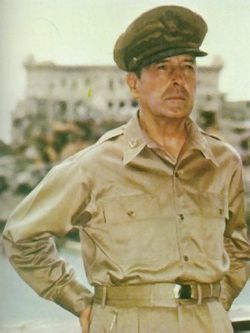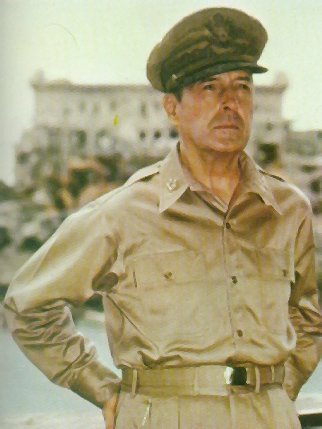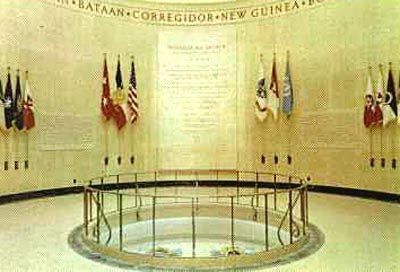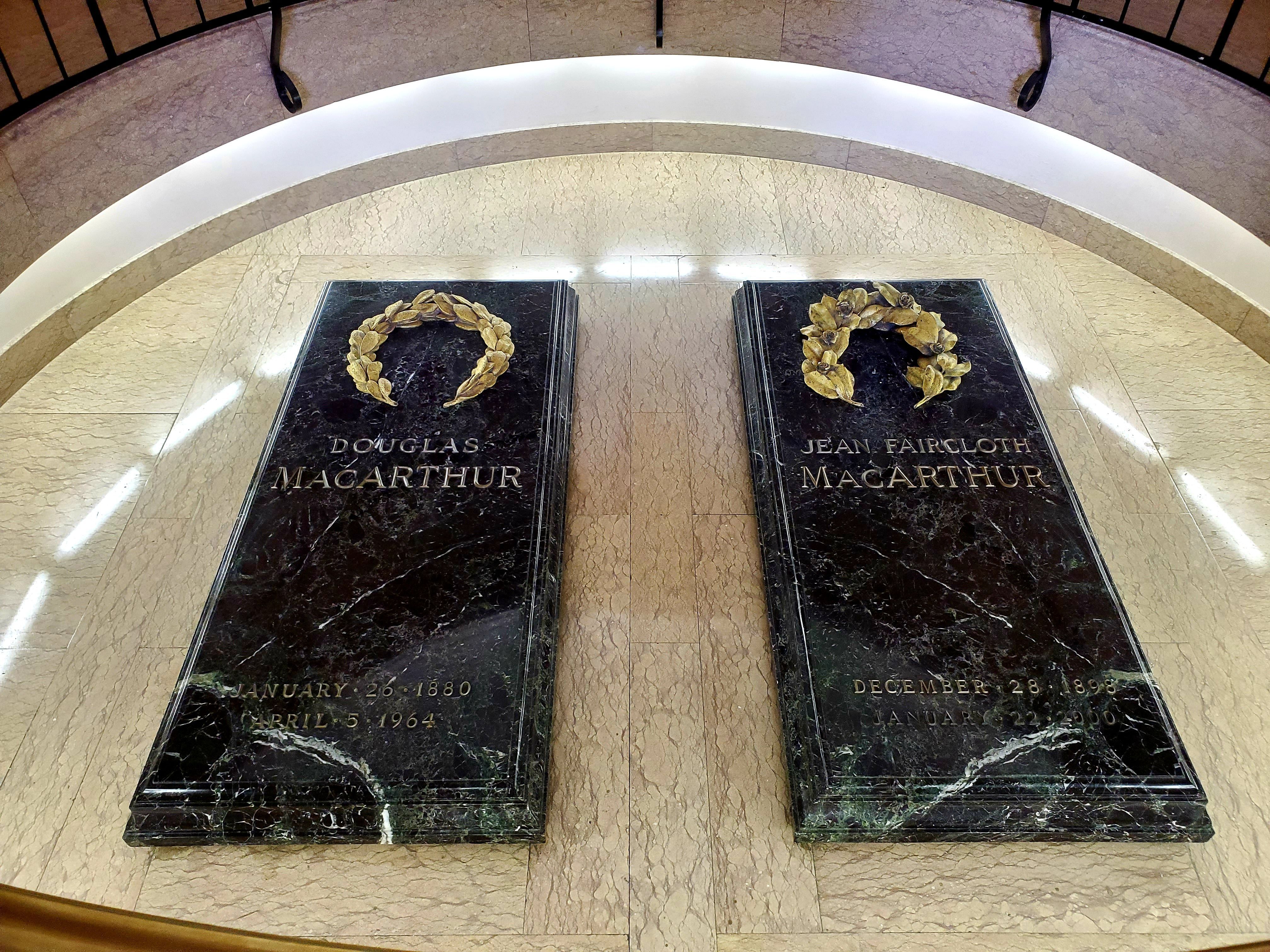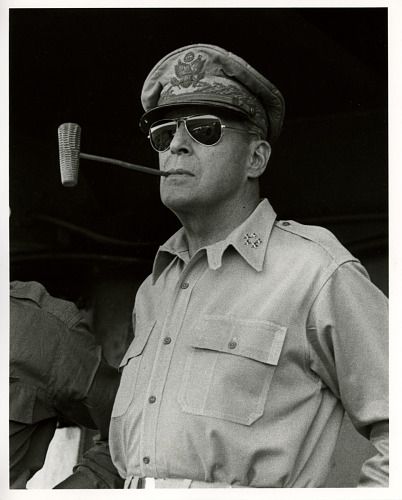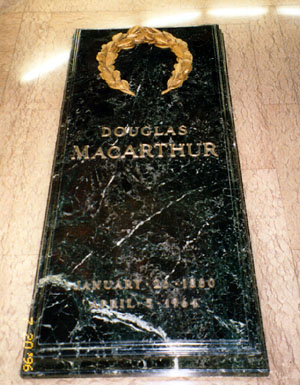The last of 3 children born to Lt. General Arthur MacArthur and Mary Pinkney Hardy, he attended the U.S. Military Academy, West Point, graduating first in his class of 1903, and setting an academic record that has yet to be equaled.
During World War I, he rose rapidly in rank, becoming Major General and Commander of the 42nd Infantry Division (Rainbow Division). He was constantly at the front, exposing himself to the same danger as his men, and was twice wounded. He earned 2 DSCs, the DSM, and 7 Silver Star Medals during this war. After the war, he married the former Louise Brooks in 1922. There were no children born to this marriage.
He was Superintendent of West Point from 1919-1922. In 1928, he became the Commanding General of the Philippine Department, making many influential friends who would have a later impact on his life. From 1930 to 1935, he became Chief of Staff in the U.S. Army, and was promoted to General (4 stars), the highest rank the Army could then make him. During this period, he ironically took a dislike to Colonel George C. Marshall and attempted to end Marshall's career by giving him a dead-end assignment.
He retired from the Army in 1937, and at the request of President Manuel Quezon, became Commander of the Philippine Army. There he met and married Jean Faircloth, who became his devoted wife for the remainder of his life. They had one child, a son. Jean MacArthur accompanied her husband in all of his future jobs, never leaving his side, and sharing his hardships.
When the U.S. entered World War II, General MacArthur was recalled to active duty in the U.S. Army and conducted a brilliant but unsuccessful defense of the Philippines, for which he was awarded the Medal of Honor. Prepared to surrender with his forces in the Philippines, he was personally ordered to Australia by President Roosevelt, where he was appointed Commander-in-Chief of the U.S. Armed Forces, Southwest Pacific. He was promoted to General of the Army (equivalent to the European rank of Field Marshal) in 1944. In September 1945, he personally accepted the surrender of Japan aboard the battleship USS Missouri.
From 1945 to 1951, he was the Military Governor of occupied Japan and personally wrote most of the Japanese Constitution. His actions during this period won great praise from the Japanese for bringing them back into the modern world following the excesses of the war.
In 1950, he was appointed Supreme Commander of the United Nations Forces in Korea when the Korean War began. In perhaps the most controversial time of his life, President Truman fired him on April 11, 1951, for reasons still debated today.
Upon his return to the U.S., MacArthur was given a ticker-tape parade in New York City and was allowed the honor to address a Joint Session of Congress. There was an unsuccessful attempt by Republicans to have him run for President in 1952, but he deferred, and the nomination went to General of the Army Dwight D. Eisenhower.
After retirement, he became Chairman of the Board for the Remington Rand Corporation, and spent his remaining years in New York City, speaking out on public issues. His final address, in January 1962, to the graduating class at West Point is considered one of his finest speeches.
His Medal of Honor citation reads "For conspicuous leadership in preparing the Philippine Islands to resist conquest, for gallantry and intrepidity above and beyond the call of duty in action against invading Japanese forces, and for the heroic conduct of defensive and offensive operations on the Bataan Peninsula. He mobilized, trained, and led an Army that has received world acclaim for its gallant defense against the tremendous superiority of enemy forces in men and arms. His utter disregard of personal danger under heavy fire and aerial bombardment, his calm judgment in each crisis, inspired his troops, galvanized the spirit of resistance of the Filipino people, and confirmed the faith of the American people in their Armed Forces."
The last of 3 children born to Lt. General Arthur MacArthur and Mary Pinkney Hardy, he attended the U.S. Military Academy, West Point, graduating first in his class of 1903, and setting an academic record that has yet to be equaled.
During World War I, he rose rapidly in rank, becoming Major General and Commander of the 42nd Infantry Division (Rainbow Division). He was constantly at the front, exposing himself to the same danger as his men, and was twice wounded. He earned 2 DSCs, the DSM, and 7 Silver Star Medals during this war. After the war, he married the former Louise Brooks in 1922. There were no children born to this marriage.
He was Superintendent of West Point from 1919-1922. In 1928, he became the Commanding General of the Philippine Department, making many influential friends who would have a later impact on his life. From 1930 to 1935, he became Chief of Staff in the U.S. Army, and was promoted to General (4 stars), the highest rank the Army could then make him. During this period, he ironically took a dislike to Colonel George C. Marshall and attempted to end Marshall's career by giving him a dead-end assignment.
He retired from the Army in 1937, and at the request of President Manuel Quezon, became Commander of the Philippine Army. There he met and married Jean Faircloth, who became his devoted wife for the remainder of his life. They had one child, a son. Jean MacArthur accompanied her husband in all of his future jobs, never leaving his side, and sharing his hardships.
When the U.S. entered World War II, General MacArthur was recalled to active duty in the U.S. Army and conducted a brilliant but unsuccessful defense of the Philippines, for which he was awarded the Medal of Honor. Prepared to surrender with his forces in the Philippines, he was personally ordered to Australia by President Roosevelt, where he was appointed Commander-in-Chief of the U.S. Armed Forces, Southwest Pacific. He was promoted to General of the Army (equivalent to the European rank of Field Marshal) in 1944. In September 1945, he personally accepted the surrender of Japan aboard the battleship USS Missouri.
From 1945 to 1951, he was the Military Governor of occupied Japan and personally wrote most of the Japanese Constitution. His actions during this period won great praise from the Japanese for bringing them back into the modern world following the excesses of the war.
In 1950, he was appointed Supreme Commander of the United Nations Forces in Korea when the Korean War began. In perhaps the most controversial time of his life, President Truman fired him on April 11, 1951, for reasons still debated today.
Upon his return to the U.S., MacArthur was given a ticker-tape parade in New York City and was allowed the honor to address a Joint Session of Congress. There was an unsuccessful attempt by Republicans to have him run for President in 1952, but he deferred, and the nomination went to General of the Army Dwight D. Eisenhower.
After retirement, he became Chairman of the Board for the Remington Rand Corporation, and spent his remaining years in New York City, speaking out on public issues. His final address, in January 1962, to the graduating class at West Point is considered one of his finest speeches.
His Medal of Honor citation reads "For conspicuous leadership in preparing the Philippine Islands to resist conquest, for gallantry and intrepidity above and beyond the call of duty in action against invading Japanese forces, and for the heroic conduct of defensive and offensive operations on the Bataan Peninsula. He mobilized, trained, and led an Army that has received world acclaim for its gallant defense against the tremendous superiority of enemy forces in men and arms. His utter disregard of personal danger under heavy fire and aerial bombardment, his calm judgment in each crisis, inspired his troops, galvanized the spirit of resistance of the Filipino people, and confirmed the faith of the American people in their Armed Forces."
Bio by: Kit and Morgan Benson
Family Members
Other Records
Advertisement
See more MacArthur memorials in:
Explore more
Sponsored by Ancestry
Advertisement
